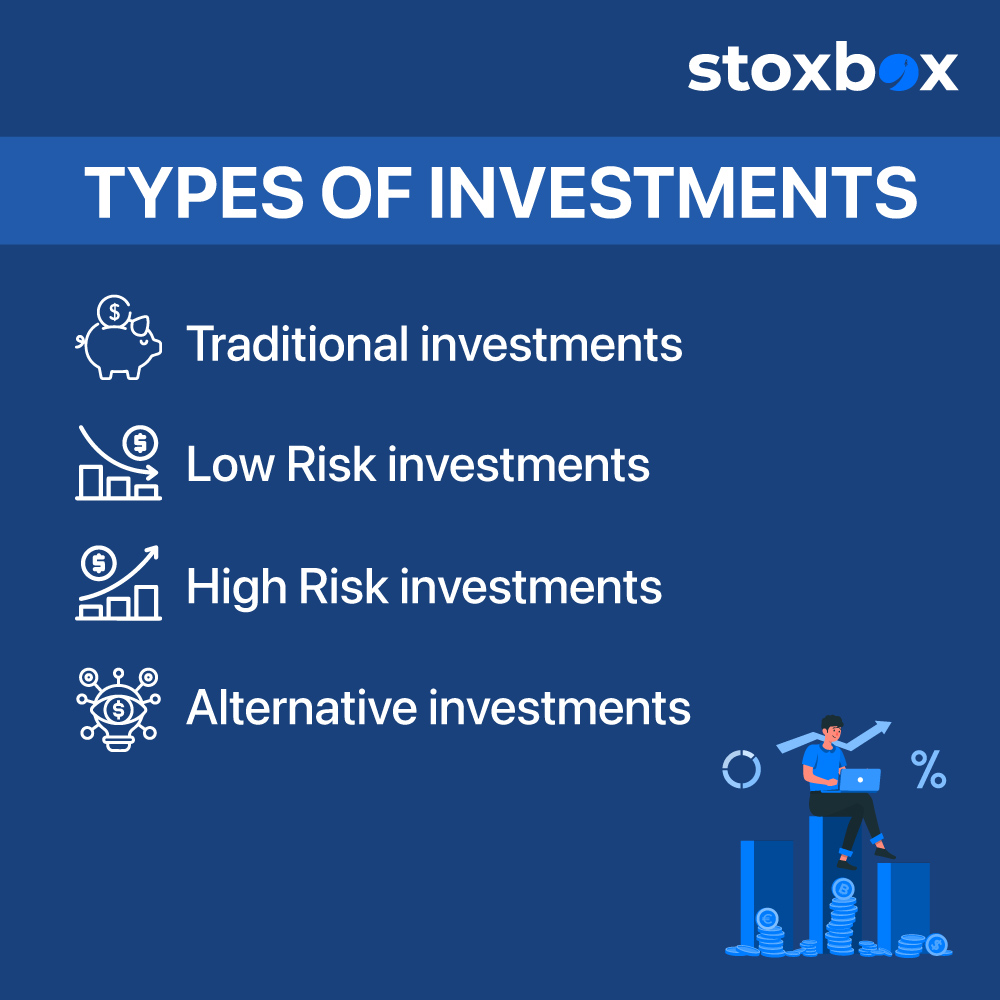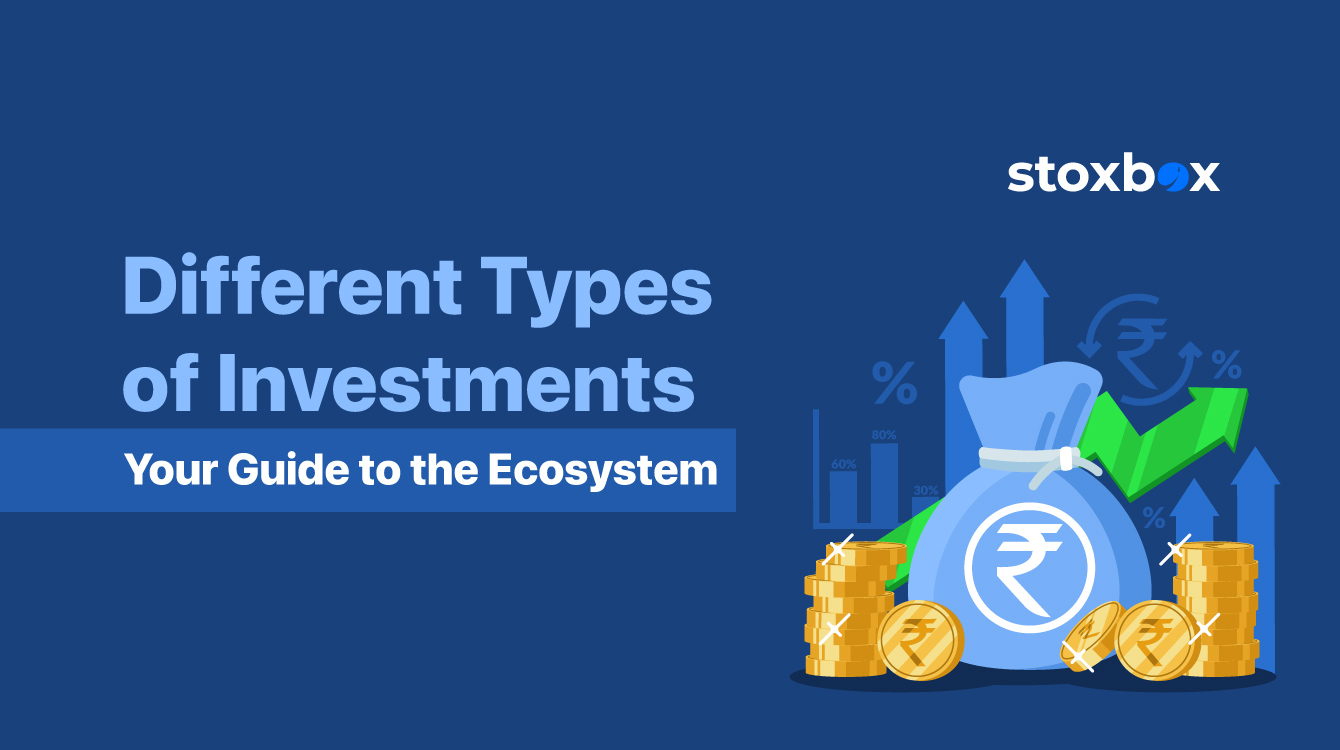Understand different type of investments and how it helps in building your wealth
Table of Contents
Investing is essential for building wealth, but choosing the right types of investments can feel overwhelming. How do you know if you’re picking the best options for your goals? What if your investments don’t keep up with inflation? These are common concerns for many investors.
Personalizing your investments to align with your financial goals, risk tolerance, and timelines can help you find these challenges. Whether you’re saving for retirement, a home, or just looking to grow your wealth, understanding the options available is the first step. This guide breaks down the various investment avenues to help you make smarter decisions.
What Are the Types of Investments?
- Investments are broadly categorized into Traditional Investments, Low-risk Investments, High-risk Investments, and Alternative Investments based on their risk, potential returns, and time horizons.
- Understanding these categories helps investors make informed decisions that align with their financial goals, whether they focus on growth investing or balancing their portfolio with low-risk investment options.
- Know each category to explore how these options, including long term vs short term investments, can fit into your financial journey.

Traditional Investments
Traditional investments, such as fixed deposits, public provident funds, savings accounts, and government bonds, have been trusted for generations. These types of investments are known for their safety and fixed returns, making them early in financial planning. Let’s explore these financial instruments to understand their role in building a secure financial foundation.
Fixed Deposits (FDs)
Fixed deposits remain a go-to choice for those seeking predictable returns. You can invest a lump sum for a fixed tenure and earn a guaranteed interest rate, typically ranging from 5% to 6.5% for a five-year period in India. While FDs are low-risk, their returns often lag behind inflation. As part of the financial products list, FDs are ideal for risk-averse individuals aiming to preserve capital.
Public Provident Fund (PPF)
The Public Provident Fund is a long-term financial investment tool backed by the government. With a lock-in period of 15 years, PPF offers compounded interest and tax-saving benefits under Section 80C. This investment option is perfect for those with long-term goals like retirement planning, providing secure and stable returns.
Savings Accounts
Savings accounts are one of the most accessible investment instruments, allowing you to store your money securely while earning modest interest. Though returns are low compared to other options, the liquidity and convenience of savings accounts make them an essential part of any financial products list, particularly for short-term needs or emergencies.
Government Bonds
Government bonds are debt securities issued to fund public projects, offering fixed interest payments. These bonds are considered risk-free as they are backed by the government, ensuring safety and stability. They are a great choice for conservative investors who value steady income over higher but uncertain returns.
Low-Risk Investments
If you are a risk-averse investor, low-risk investment options like government securities and debt mutual funds can provide a safe haven for your savings. These investments focus on capital preservation and steady returns, making them ideal for individuals seeking financial stability. Let’s explore some of the different investment avenues that offer security and predictable growth.
Debt Mutual Funds
Debt mutual funds are a popular choice among conservative investors as they invest in government gilts or AAA-rated corporate bonds. These funds reduce market volatility by focusing on fixed-income securities, offering steady yields over the medium or long term. As part of different types of investments, they allow you to diversify while ensuring lower risk, making them a reliable option for stable returns.
National Savings Certificates (NSC)
National Savings Certificates are government-backed schemes that guarantee returns and offer tax-saving benefits under Section 80C of the Income Tax Act. Suitable for those seeking low-risk investment options, NSC provides fixed interest over its tenure, ensuring predictable growth for your savings while maintaining the safety of sovereign debt.
Sukanya Samriddhi Yojana (SSY)
The Sukanya Samriddhi Yojana is a government initiative aimed at promoting savings for a girl child’s future. It offers high interest rates compared to many other investment avenues and comes with tax benefits. This long-term saving scheme is a targeted approach for securing funds for education or marriage expenses, ensuring financial security with minimal risk.
Recurring Deposits (RDs)
Recurring deposits are a convenient way to save regularly while earning predictable interest. These investments suit individuals who prefer low-risk, small-amount contributions to build wealth over time. As part of different types of investments, RDs encourage disciplined savings while offering guaranteed returns over their chosen tenure.
High-Risk Investments
For investors willing to take on more risk in pursuit of higher returns, high-risk investments like equities, mutual funds, derivatives, and cryptocurrencies can offer significant growth opportunities. Strategies such as momentum investing can help capture short-term price trends, making them a valuable addition to your portfolio.
These various types of investments cater to those with a higher risk appetite and a desire to maximize returns through diversification and strategic allocation. Let’s explore how many types of investment options exist under this category.
Equity Investments
Equity investments involve directly purchasing stocks, allowing investors to own shares in companies and benefit from their growth. Depending on your risk appetite, you can choose large-cap companies for stability, mid-cap for balanced growth, or small-cap stocks for higher potential returns. As one of the most common high-risk investments, equities provide long-term wealth creation opportunities but require careful portfolio management to mitigate risks.
Mutual Funds
Equity-oriented mutual funds pool resources to invest in a diversified portfolio of stocks, managed by professionals. These funds range from large cap focused schemes to sectoral or thematic funds, offering investors a variety of options to match their risk tolerance and return expectations. Mutual funds, a prominent example of various types of investment, are ideal for those who prefer expert management while participating in the equity market.
Derivatives
Derivatives, such as futures and options, allow investors to speculate on market movements or hedge their existing positions. These instruments amplify potential returns but come with significant risks due to their leveraged nature. As part of high-risk investments, derivatives require a strong understanding of market dynamics and are best suited for experienced investors aiming to enhance portfolio performance.
Cryptocurrency
Cryptocurrency represents an emerging and volatile asset class, offering high growth potential for those willing to find its risks. Digital currencies like Bitcoin and Ethereum have gained popularity as alternative investments, appealing to tech-savvy and high-risk investors. While cryptocurrencies are inherently speculative, they hold promise as a long-term investment in the evolving digital economy.
Alternative Investments
If you’re looking to explore different investment options beyond traditional investing, alternative investments like real estate, gold, and private equity can provide unique opportunities. These modes of investment are ideal for diversifying your portfolio and finding types of investment in economics that offer both tangible assets and niche market appeal. Let’s explore these intriguing alternatives.
Real Estate
Real estate remains one of the most sought-after modes of investment, offering substantial returns over the long term. Investing in physical property, whether residential or commercial, provides value appreciation and potential rental income. While real estate requires a longer investment horizon due to its illiquid nature, Real Estate Investment Trusts (REITs) offer a modern alternative for gaining exposure without directly owning property.
Gold and Precious Metals
Gold has long been considered a safe-haven asset, particularly during periods of economic uncertainty. Known for its ability to hedge against inflation, gold is a timeless addition to any portfolio. Today, investors can also opt for Gold Exchange Traded Funds (ETFs) to gain exposure without dealing with the hassles of physical storage, making it a convenient and secure investment option.
Venture Capital and Private Equity
Venture capital and private equity allow investors to fund startups or private companies in exchange for equity ownership. These types of investments in economics are high-risk but offer significant potential rewards if the companies succeed. They are ideal for seasoned investors seeking to support innovative businesses while portfolio diversification.
Art and Collectibles
Art and collectibles represent a niche category of alternative investments, appealing to those with a passion for unique assets. From rare paintings to vintage items, these investments hold intrinsic value and often appreciate over time. However, they require careful market knowledge and patience, as their liquidity can be limited.
Benefits of Diversifying Across Investment Types
Diversifying across different types of investment is key to reducing risks and achieving balanced returns. By spreading your portfolio across various financial investment avenues, you can safeguard your wealth from market volatility while creating a more stable and consistent growth trajectory.
Why Diversification is Important?
Diversification acts as a shield for your investments, helping to minimize losses during market fluctuations. For instance:
- Risk Mitigation: By investing in both low-risk and high-risk assets, you ensure that losses in one category can be offset by gains in another.
- Consistent Returns: A diversified portfolio provides stability by balancing high-growth assets like equities with safer investments such as bonds or fixed deposits.
- Capital Preservation: Diversifying into assets like gold or real estate helps retain value during economic downturns.
How Diversification Stabilizes Portfolios?
A well-diversified portfolio aligns with different market cycles, ensuring steady returns over time. For example, during a stock market slump, assets like government bonds or gold often perform better, cushioning the impact on your portfolio.
Example Portfolio Allocation Table
| Investment Type | Suggested Allocation (%) | Risk Level | Purpose |
|---|---|---|---|
| Low-Risk (FDs, Bonds) | 40% | Low | Capital preservation, stable returns |
| High-Risk (Equity, Mutual Funds) | 40% | High | Growth-oriented investments |
| Alternative (Gold, Real Estate) | 20% | Medium to High | Inflation hedge, long-term value |
Common Challenges Faced by Investors
Investing can be tricky, especially when it comes to risk assessment, allocation, and market timing, but understanding these challenges can help you make smarter decisions.
Let’s explore these hurdles and how platforms like StoxBox can simplify choosing different investment options and investment instruments for a balanced portfolio.
Mistakes in Risk Assessment
One of the most common pitfalls is misjudging your risk tolerance. Many investors either overestimate their ability to handle losses or become too conservative, missing out on potential gains. For example:
- Overestimating Risk Appetite: Investing heavily in high-risk assets like cryptocurrencies without adequate preparation can lead to significant losses.
- Underestimating Growth Potential: Avoiding different investment options like equities out of fear may limit long-term returns.
A balanced risk assessment involves knowing your financial goals, time horizon, and emotional capacity to handle market fluctuations.
Improper Asset Allocation
Asset allocation errors occur when investors don’t diversify their portfolios effectively. Examples include:
- Allocating too much to a single asset class, such as equities, which can lead to volatility.
- Neglecting low-risk investment instruments like bonds, which provides stability during market downturns.
Proper allocation requires spreading investments across categories such as traditional, high-risk, and alternative investments to achieve a stable portfolio.
Mistimed Market Decisions
Market timing is another challenge, as attempting to buy low and sell high is easier said than done. Many investors panic during downturns, selling assets prematurely, or waiting too long for a “perfect entry point.” Relying on systematic approaches, like SIPs (Systematic Investment Plans), can help eliminate emotional decisions.
How Tools Like StoxBox Can Help?
Platforms like StoxBox provide expert guidance and user-friendly tools for investment management. They simplify:
- Portfolio Tracking: Keep an eye on your performance across different asset classes.
- Risk Analysis: Use analytics to gauge whether your investments align with your financial goals.
- Investment Advice: Get recommendations on optimizing investment instruments for better returns.
How to Choose the Right Investment?
Selecting the right investment requires understanding your risk tolerance, financial goals, and timelines while balancing traditional options with modern approaches like growth investing or value investing. Let’s explore strategies that can help you identify the best choices for your financial future.
Assessing Your Risk Tolerance
Risk tolerance is the foundation of investment planning. Before committing to any asset, ask yourself:
1. Can you handle short-term losses?
If not, focus on stable options like bonds or fundamental investing strategies.
2. Are you aiming for long-term growth?
Equities or mutual funds may suit your portfolio better.
Knowing your risk appetite will guide whether to lean towards traditional investments for safety or explore higher-risk alternatives like PMS vs direct equities for higher returns.
Aligning Investments with Financial Goals
Your financial goals dictate the type of investments you should prioritize:
- Short-Term Goals: Savings accounts, FDs, or debt mutual funds are ideal for achieving near-term stability.
- Long-Term Goals: For wealth creation, consider growth investing through equities or mutual funds. Long-term strategies often outperform when aligned with market trends.
Setting clear goals ensures you stay focused and choose investments that work towards your objectives.
Balancing Traditional and Modern Investments
Creating a balanced portfolio involves mixing reliable traditional investments, like government bonds, with modern options, such as real estate or venture capital. For example:
- Traditional Investments: Focus on stable returns with minimal risk.
- Alternative Investments: Explore opportunities in high-growth sectors like cryptocurrencies or private equity.
This balance helps achieve both stability and growth in your portfolio.
Time Horizons and Liquidity Needs
Understand how long you can stay invested and your need for liquidity. For instance:
- Short Timelines: Investments in fundamental investing tools like debt funds or NSC are better suited.
- Long-Term Plans: Consider value-focused strategies like value investing in stocks or real estate.
Example: Portfolio Strategy Based on Risk Appetite
| Risk Appetite | Investment Types | Time Horizon |
|---|---|---|
| Conservative | Bonds, FDs, PPF | Short-Term |
| Balanced | Mutual Funds, Large-Cap Equities | Medium-Term |
| Aggressive | Small-Cap Stocks, Cryptocurrencies | Long-Term |
Conclusion
Aligning your investments with your financial goals and risk appetite is essential for building a stable and growth-oriented portfolio. Whether you aim for long-term vs short-term investments, choosing the right mix of assets can make a significant difference in achieving your financial objectives.
For example, if you want equity exposure, you can choose to invest directly in the stock market, via equity mutual funds, or even in curated portfolios like an equity StoxBox. As a stock-rocking company, StoxBox simplifies investing by offering tools, curated portfolios, and expert guidance to help you make informed decisions. Whether you’re learning how to invest in SIP or diversifying into equities, StoxBox empowers you with personalized solutions for every investment need.
Frequently Asked Questions
What is the best type of investment for beginners?
For beginners, low-risk options like fixed deposits, PPFs, and debt mutual funds are recommended as they provide safety and steady returns. As your understanding grows, you can explore balanced options like large-cap mutual funds or equity investments for higher returns.
How does inflation impact investment returns?
Inflation reduces the purchasing power of money, meaning the real value of returns from investments may decrease over time. To beat inflation, consider growth investing options like equities or real estate, which typically offer returns above the inflation rate.
Which investments are tax-saving in India?
Tax-saving options include PPFs, ELSS mutual funds (Equity-Linked Savings Scheme), National Pension System (NPS), Sukanya Samriddhi Yojana (SSY), and National Savings Certificates (NSC). These provide tax deductions under Section 80C of the Income Tax Act.
What are the risks of investing in cryptocurrencies?
Cryptocurrencies are highly volatile and lack regulatory oversight, which makes them riskier compared to traditional investments. However, they are gaining popularity as a potential long-term asset in diversified portfolios.
Can I combine traditional and alternative investments in one portfolio?
Yes, combining traditional investments like FDs and bonds with alternative investments like real estate or gold can diversify your portfolio and balance risk while achieving long-term financial goals.
How often should I rebalance my investment portfolio?
Rebalancing depends on market conditions and your financial goals but is typically recommended every six months or annually. This ensures your portfolio aligns with your risk tolerance and target asset allocation.
What is the difference between SIPs and lump-sum investments?
Systematic Investment Plans (SIPs) allow you to invest small amounts regularly, reducing market timing risks, while lump-sum investments involve one-time contributions, which may be better during market downturns for maximum growth potential.
How does investing in equities differ from fixed-income securities?
Equities offer growth potential through capital appreciation but come with higher risks, while fixed-income securities like bonds provide steady returns with lower risk.
Are mutual funds a good option for beginners?
Yes, mutual funds are ideal for beginners as they are professionally managed and offer diversification, reducing the risks associated with individual stock investments.
What are the benefits of investing in real estate?
Real estate investments can provide rental income, long-term capital appreciation, and portfolio diversification. However, they require significant capital and involve illiquidity risks.
What factors should I consider before choosing an investment type?
Consider your financial goals, risk tolerance, investment horizon, and liquidity requirements to determine the best investment type for your needs.
How do alternative investments like gold or cryptocurrency fit into a portfolio?
Gold and cryptocurrencies serve as diversifiers and hedges against market volatility but should be approached cautiously due to their high price fluctuations and regulatory concerns.
Which investments are best suited for long-term wealth creation?
Equity mutual funds, stocks, and real estate are typically recommended for long-term wealth creation due to their potential for higher returns over extended periods.
Your Wealth-Building Journey Starts Here

You might also Like.
No posts found!
